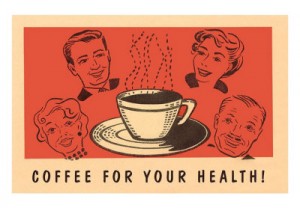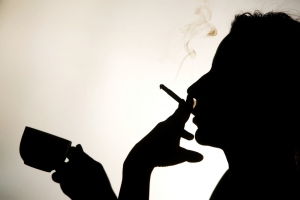Should you drink coffee? Cases for and against
March 8th, 2012
 Coffee is a big part of everyday life for millions of people throughout Australia and around the world.
Coffee is a big part of everyday life for millions of people throughout Australia and around the world.
We drink coffee for all kinds of reasons, from jump-starting our body and mind, to reaping the social benefits of enjoying a relaxing cuppa with friends. Sometimes we’ll drink it out and about, and sometimes we drink it at home, often with the aid of a coffee machine from Appliances Online.
But should we be more concerned about what our favourite drink can do to us and our society?
Reasons to drink coffee
Mental boost
 It’s the same old story – someone wakes up bleary-eyed and grumpy, has that first coffee of the day (prepared by the coffee machine in advance, thanks to an automatic timer feature, available on several models), and is magically transformed into a functional human being. Sound familiar?
It’s the same old story – someone wakes up bleary-eyed and grumpy, has that first coffee of the day (prepared by the coffee machine in advance, thanks to an automatic timer feature, available on several models), and is magically transformed into a functional human being. Sound familiar?
Many people use the caffeine in coffee to give their brain and nervous system the jolt of energy they need for peak performance. Sometimes this takes place in the morning when we first wake up – other times, taking a break to recaffeinate can provide the perspective we need to solve particularly tricky mental problems.
Caffeine provides this brain-boost by blocking the brain’s receptors for a chemical called adenosine (used to slow brain functions during sleep), tricking the brain cells into speeding up their rate of firing.
Of course, these mental boosts only really apply to those of us who aren’t regular coffee drinkers. If you regularly indulge, this mental boost is at least partially an illusory effect, created by treating one of the withdrawal symptoms of caffeine addiction. More on that later…
Benefits for the body
In addition to the mental boost, the immediate physical effects of drinking coffee include an increase in heart rate and constriction of the blood vessels, leading to blood travelling around your body faster. In some cases, this can help with headaches caused by expanded blood vessels, which is why some migraine drugs contain caffeine.
The rapidly-firing brain cells mentioned earlier also help to trigger your body’s production of adrenaline, providing an additional burst of energy and alertness, as your body adopts its primal “fight or flight” instincts.
When it comes to longer-term benefits, drinking coffee in moderation has been linked to protecting the body from heart disease, Alzheimer’s, muscle pains and even cancer, due in part to the antioxidants found in coffee. As many different studies have been conducted into the health benefits and risks of long-term coffee drinking, often reaching contradictory conclusions, you should talk to your doctor or nutritionist for more information.
Being part of an international tradition
 Whether you’re congregating in a cafe or just giving yourself a shot of will-to-live in the morning, drinking coffee means participating in a long-established tradition with many variations around the world.
Whether you’re congregating in a cafe or just giving yourself a shot of will-to-live in the morning, drinking coffee means participating in a long-established tradition with many variations around the world.
For example, in Italy it’s considered improper to drink milky coffee, such as a cappuccino, at any time after breakfast, with espresso being preferred instead. Turkish coffee meanwhile is prepared in a special pot called a cezve, resulting in a thicker, sweeter and stronger brew. And of course in the “coffee-shops” of Amsterdam, it can sometimes be rather difficult to find any actual coffee…
Australia has borrowed and adapted aspects coffee cultures from several different countries, and has also innovated some new additions to the world of coffee. The flat white, for example, is something that’s popular here and in New Zealand, but much harder to find overseas. However, it is beginning to gain popularity in both Europe and the USA.
Even if you just use coffee to stay awake, you may be following in the footsteps of some of the first recorded coffee drinkers. While the origins of coffee are not entirely clear, some of the earliest records of the drink come from 15th century Yemen, where it was used in Sufi monasteries to keep the monks awake during night time devotions.
Reasons to not drink coffee
Addiction
 Let’s not mince words here. When you get right down to it, caffeine is a drug, your friendly local baristas are dealers, and habitual coffee drinkers are addicts.
Let’s not mince words here. When you get right down to it, caffeine is a drug, your friendly local baristas are dealers, and habitual coffee drinkers are addicts.
The naturally-occurring chemicals of the coffee plant function as a psychotropic drug that helps defend the plant against animals, insects, and even other plants. If animals eat too many of the plants, they can get sick and even die. Even though the composition of these drugs is changed when the beans of these plants are harvested and processed into coffee, they still have a very real physical effect on the human body, leading to the same kind of chemical dependency seen in addiction to other drugs.
Anyone who’s had coffee can describe the “crash” feeling when the caffeine’s effects wear off – this is the result of the brain and body suddenly having to function without the chemicals the caffeine had been replacing. Trying to quit caffeine can lead to withdrawal symptoms, including headaches, fatigue and irritability as brain and body’s chemicals return to their natural state.
Worrying effects on health
 For every health benefit of coffee, there’s another health risk that’s also associated with it. While coffee can increase your mental alertness, it can also lead to feelings of anxiety and panic. While coffee can stimulate adrenaline production to increase your heart rate, this can be seriously bad news for anyone with a pre-existing heart condition.
For every health benefit of coffee, there’s another health risk that’s also associated with it. While coffee can increase your mental alertness, it can also lead to feelings of anxiety and panic. While coffee can stimulate adrenaline production to increase your heart rate, this can be seriously bad news for anyone with a pre-existing heart condition.
A recent study has indicated that coffee does not necessarily increase your risk of contracting several chronic illnesses such as cancer, strokes and diabetes. That said, other health issues, including cholesterol problems, gastrointestinal problems, ulcers and more have all been previously linked to long-term coffee-drinking. Some of these problems could be managed by enjoying coffee in moderation, but the addictive qualities of caffeine can make this difficult.
Another problem that can come with regular coffee consumption is the lifestyle associated with it. Just as the fatty foods that people often have with beer can contribute equally towards a beer belly, regularly taking your coffee with fatty pastries or cigarettes can lead to other health problems.
Impact on global society, economy and environment
 The production of coffee in the modern world has become big news in recent years. Coffee plants (as well as the cacao beans that make chocolate) are difficult plants to cultivate, requiring a great deal of hard work, special farming techniques and careful attention to produce each crop. The environmental factors are also noteworthy, with the head of coffee giant, Starbucks, anticipating problems with coffee supplies in future decades due to climate change.
The production of coffee in the modern world has become big news in recent years. Coffee plants (as well as the cacao beans that make chocolate) are difficult plants to cultivate, requiring a great deal of hard work, special farming techniques and careful attention to produce each crop. The environmental factors are also noteworthy, with the head of coffee giant, Starbucks, anticipating problems with coffee supplies in future decades due to climate change.
The massive demand for coffee has led to some fairly shonky business practices. A lot of coffee production is undertaken in developing countries, where working conditions are often compromised to keep production costs down and pricing competitive. Making coffee harvesting more economically efficient can also lead to environmental problems, with local rainforest being cleared to make way to the greatest number of coffee plants, which in turn require a great deal of water.
The recent rise to prominence of Fairtrade and other sustainable coffee initiatives have gone some way towards combating this issue, but a lot of effort is still going into making the coffee industry an ethical and environmentally sustainable one.
Your say
 Is coffee a necessary evil? A dangerous temptation? A divine brew? The path to mental and physical enlightenment?
Is coffee a necessary evil? A dangerous temptation? A divine brew? The path to mental and physical enlightenment?
As with so many other things in life, moderation may be the key. Taking a cup or two of coffee to start your day and stay pepped may be reasonable, but once you start shotgunning espresso every hour on the hour, you may be at risk of doing harm to yourself, your social life, and the world around you.
Remember that if you’ve any questions about the health benefits or risks associated with coffee, talk to your doctor or nutritionist.
In the meantime, I’m thirsty…

Leave a Reply